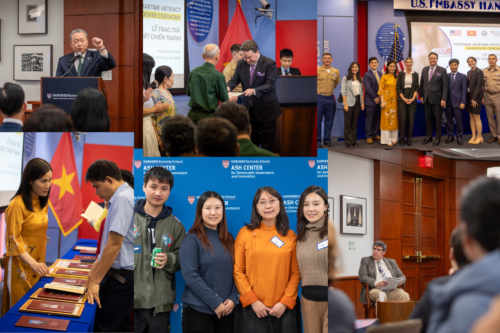Indonesian Language Class – March 6
In-Person Event
Ash Center Room 202, Suite 200 124 Mount Auburn Street
2:00 pm – 4:00 pm EST
Understanding Indonesia’s historic democratic transformation and growth as an important economic power
As the world’s third largest democracy and the first majority-Muslim democracy, Indonesia continues to be an important model for positive institutional change. It is also a growing economic power as a member of the G-20 with a trillion dollar economy, and is located at several strategic global crossroads. Over the past three decades, Indonesia has transformed itself from an authoritarian, unitary state into a multi-party, decentralized democracy with direct election of village chiefs up to the president, as well as local and national legislative representatives.
Launched in 2010 with a $10.5 million gift from the Rajawali Foundation, the Indonesia Public Policy Program promotes research, education, and capacity building in support of democratic governance and institutional development in Indonesia. Since its inception, the program has brought Indonesians to Harvard Kennedy School (HKS) as students, fellows, and executive education program participants; run a variety of training programs for Indonesian public officials; and sponsored a variety of policy conferences and convenings.
The Indonesia Public Policy Program currently sponsors activity-based programming, including hosting Indonesian fellows and executive education participants; participating in collaborative research; convening conferences and seminars; and facilitating visiting delegations of senior Indonesian leaders at HKS.
The Indonesia Public Policy Program is led by Jay Rosengard, Adjunct Lecturer in Public Policy.
The Indonesia public policy program has hosted numerous conferences convening academics, civil servants, and leaders. To find an archival record of previous conferences, please click here.
Previous research from the Indonesia Public Policy Program before 2010 includes:
David Dapice and Edward Cunningham: Squaring the Circle: Politics and Energy Supply in Indonesia.
Rema Hanna, Targeting the Poor: Evidence from a Field Experiment in Indonesia, http://www.nber.org/papers/w15980
Rema Hanna, Involving Communities in Identifying the Poor, http://www.povertyactionlab.org/publication/involving-communities-identifying-poor
Rema Hanna, Network Structure and the Aggregation of Information: Theory and Evidence from Indonesia, https://research.hks.harvard.edu/publications/workingpapers/citation.aspx?PubId=8585&type=WPN
Jose A. Gomez Ibanez, HKS Case: 1976.0 Jakarta’s Transportation Problems, https://case.hks.harvard.edu/jakartas-transportation-problems/
Jose A. Gomez Ibanez, 719.0 Financing Indonesia’s Roads, https://case.hks.harvard.edu/financing-indonesias-roads/
Anuraj Shankar, Maternal Multiple Micronutrient Supplements and Child Cognition: A Randomized Trial in Indonesia
http://pediatrics.aappublications.org/content/early/2012/08/15/peds.2012-0412.abstract.
In-Person Event
Ash Center Room 202, Suite 200 124 Mount Auburn Street
2:00 pm – 4:00 pm EST
In-Person Event
Ash Center Room 202, Suite 200 124 Mount Auburn Street
2:00 pm – 4:00 pm EDT
In-Person Event
Ash Center Room 202, Suite 200 124 Mount Auburn Street
2:00 pm – 4:00 pm EDT
Q+A
M. Chatib Basri answers questions about his paper, exploring Indonesia’s strategic alignment and leverage, maritime position, and the implications of domestic reform on Indonesia’s regional impact.
Feature
This past semester, the Rajawali Foundation Institute for Asia engaged in conversations and research on topics ranging from Indonesia’s election to US-Taiwan relations with the goal of continuing to develop policy solutions to the region’s most pressing concerns.
Feature
Democracy and development were on the ballot during Indonesia’s national elections earlier this month according to experts at a Rajawali Foundation Institute for Asia event on what Prabowo Subianto’s victory now portends for the future of the country.
Video
On February 23, the Rajawali Foundation Institute for Asia hosted a Global Elections Webinar Series event to reflect on the implications of Prabowo’s landslide victory for the state of democracy and prospects for national development in Indonesia.
Policy Brief
Occasional Paper
Media Release
Book




